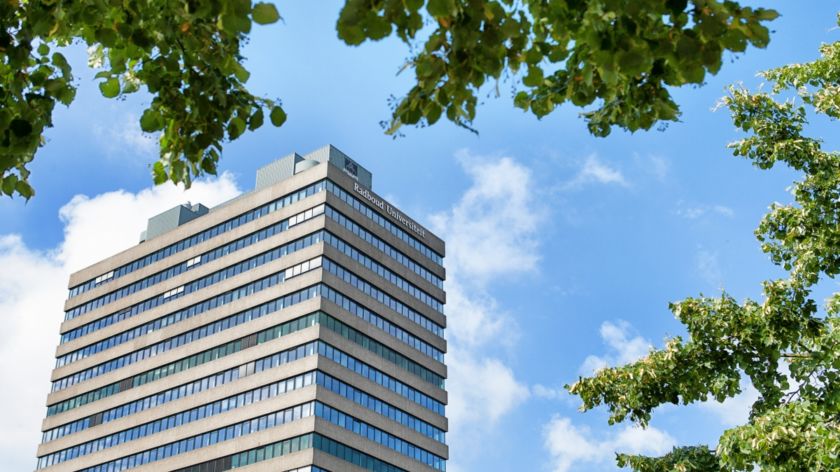29 new claims about social safety at the Faculty of Philosophy
-
 Het Erasmusgebouw. Foto: Dick van Aalst
Het Erasmusgebouw. Foto: Dick van Aalst
In the past few weeks, almost thirty employees and students made claims about social security at the Faculty of Philosophy, Theology and Religious Studies (FFTR). They feel intimidated, and mentioned that there were 'inappropriate relationships'. The university is working on a culture change.
Intimidating or sexist remarks, ‘inappropriate’ relationships between students and teachers and among students, people feeling unfairly treated. It’s just a selection from the 29 claims made at Berenschot, the consultancy firm which – in two fases – researched the social security at the Faculty of Philosophy, Theology and Religious Studies (FFTR), commissioned by the Executive Board (CvB).
On Monday, the university published the results of the fina phase of the investigation. All students and employees received an e-mail. The conclusion was clear, according to the Executive Board: students and staff members have not experienced the faculty as a safe place over the past few years. The university will start a project to change the culture.
Inappropriate behaviour
Last summer, the board initiated the first inquiry at the faculty. The reason for this was that several people had complained about ‘multiple people’. Professor Philosophy of the Middle Ages and Renaissance Paul Bakker was one of the subjects of the investigation and because of that, he had to waive his intended deanship.
Berenschots findings, which were made public in the middle of September, confirm these ‘signals’. Bakker was responsible for inappropriate behaviour (there were no more details) and got a faculty ban until February 2021. However, Wilma de Koning, vice president of the Executive Board, announced in September that he was allowed to remain a professor ‘for the time being’. Other employees did not face measures yet, even though some of them had to come in for a ‘serious discussion’, De Koning says.
‘Fitting measures have been en will be taken’
The initial investigation raised more questions, the vice president said, and because of that a second one was conducted. That has been finished as well. Based on the findings, ‘fitting measures have been en will be taken’, the board now writes in its e-mail. Who is involved and what these measures actually contain – a faculty ban, like Bakker’s, or something else – remains unclear. Wilma de Koning: ‘It is very understandable that many students and employees are very curious about what exactly happened. PHowever, some of those involved explicitly indicated that they do not want this to be shared. On top of that, all those involved wish to remain anonymous. Because of that, the Executive Board cannot and will not say more about that.’
However, De Koning is willing to give a general overview of the 29 new claims which Berenschot received in the past weeks. The board had explicitly asked people in the faculty to come forward if they thought something was wrong with the social security.
Harassment
The claims cover the full spectrum of harassment, from feeling inappropriately approached until sexist behaviour and inappropriate relationships. It also occurred that employees or students were aware of such an unwanted situation, but did not (dare to) take action. Other claims were about claims which were made in the past, but had never been dealt with.
The incidents which are reported, took place during a period of fifteen years. Twelve in the past two years, six between two and six years ago. Nine reports, almost a third of the total, are about things that happened nine to fifteen years ago. De Koning is unsure whether that is a lot or not. ‘Every claim worries me, of course, every incident is one too many. You don’t want this to happen within your organisation. At the same time, it’s very important for people to feel the freedom to come forward when there is a reason to do that.’
Indoors
De Koning calls it ‘incredibly brave that people want to share their sometimes very serious story.’ She repeats that the Executive Board tries to be as transparant as possible in the FFTR situation, but that confidentiality requires that details stay indoors. The stories shared by students and employees with researchers, are ‘vulnerable’, according to De Koning.
How does it go on from here? The board has invited all who came forward for a conversation with the counselor and the director of human resources. Whoever appreciates it, can make use of that and discuss possible steps. This can lead to formal (complaint) procedures, and possibly to new measures. De Koning: ‘We really want to try to help people along. Of course it is up to them if they take us up on this offer. We realise that it isn’t easy.’
‘We know that you don’t just change a culture.’
For bureau Berenschot, the job is done: there are two reports about social safety and manners of communication within the faculty. It is now up to the university and faculty boards to reach the desired culture change. ‘In that way, alle these negative cases will lead to something positive,’ says De Koning.
A different external bureau, TwynstraGudde, will lead this process. From November until February, there will be dialogues between everybody at the faculty – employees and students. These should primarily address questions such as what ‘normal’ behaviour is, when someone is crossing a boundary, and what you can do when you witness a situation that is not right.
With an eventual university-wide code of conduct, the university hopes to make reporting incidents as simple as possible. A new team of counselors has to contribute to a better way of handling those reports. Eventually, the vice president hopes that problems which transcend individual incidents will emerge sooner, such as issues of leadership. ‘We know that you don’t just change a social culture, it will take a long time to achieve. But that is no reason not to do it.’
Faculty FFTR aims at three goals
The conclusions of the Berenschot report are sufficient reason for the FFTR Faculty Board to address three subjects, as stated by the board in their e-mail to staff and students. First and foremost, the rules regarding the often informal interaction within the small-scale faculty should be stated ‘more explicitly’. The board also wants the academic climate to become more open. People do not always feel that they have been heard or taken seriously, according to the reports. Finally, the faculty will work towards greater diversity and gender equality. ‘At FFTR we still have a long way to go to increase our awareness of bias, behaviour, and relationships between men and women.’



